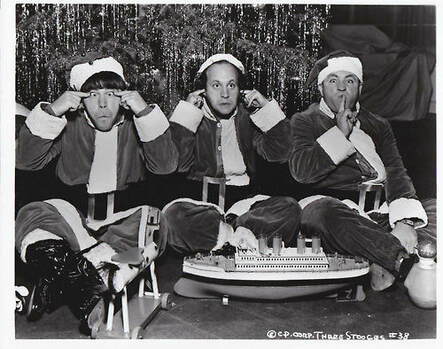|
Growing up with The Three Stooges as my family has pointed out something to me: the immense, age-defying, life-changing effect that you can have on people. We’ve all witnessed that, I’d imagine, with celebrities we admire and artists and philosophers. We’ve seen what one man/woman can do (David Bowie, JK Rowling, Stan Lee…), but it’s distant. We are the effect of it, or maybe we’ve witnessed it, but we haven’t all created it. For me, I’ve been a conduit for that effect. I have watched people light up and laugh and become filled with love and nostalgia just because I said that my great-grandfather was Moe. Men, women, strangers, friends, young, old… It’s like wielding a little bit of old, inherited power. “You made my day,” I’ve been told. The Three Stooges were Jewish men in a time when parts of the world hated anything Jewish. They were their own kind of funny—an iconic kind of funny. They could be appreciated by anyone. They struck something, something I don’t think people strike often these days. Their humor needed no language. You could see it, quite literally. But it was more than that. They loved what they did, and so did others. Myself included. And they knew. That’s the thing. I can’t speak as much for the other guys, but my dad told me that Moe would keep photos and things in the trunk of his car, so if ever he got recognized, he would have something to sign and give to them. That’s a kind of appreciation often lost these days. They knew what they had. They knew what that meant. “I recall that every Christmas my dad played Santa to the children at an organization called the Spastic Children’s Guild. These were young children with spastic paralysis. Moe would go to downtown L.A. and haunt the wholesale houses. These were places owned by fans and people he knew from Brooklyn days. He would ask everyone he contacted to donate toys, clothing you name it. As payment for the donations, he’d tell a joke and have the donors in Stooge stitches. My dad was always concerned about helping “the underdog.” He would always say how lucky he felt to do what he loved to do and make a living while doing it.” – Joan Howard Maurer, my grandmother (read the original article here) Despite the slapstick violent humor, that’s the kind of person he was. He saw the other side. He knew who was watching, and he cared too. I think that’s part of why they’ve endured so well. I forget sometimes about the other side of art. I’ve always tried to be vocal about what I do, and about the fact that you just have to write and keep writing. Some of the younger friends I had back in my teens would come to me for advice—and they still do. They remember from back in the day. New ones too. And you know what? That’s so cool. Not everyone can say that. It’s no Stooge-level impact. I will never be exactly what they were (which is totally fine), but I can see a small power forming, a small ability to impact other people. It’s all the more reason and motivation to continue. I’ve come this far, and I’m starting to see that there are people on the other side of my art. I recognize that I’ve set myself up as someone who is going to “do things”. I can see it already, thanks to the Stooges and the stunning effect they created, and I know it is no small thing to matter in someone else’s world.
0 Comments
Leave a Reply. |
AuthorTessa Maurer Archives
April 2020
Categories
All
|

 RSS Feed
RSS Feed
